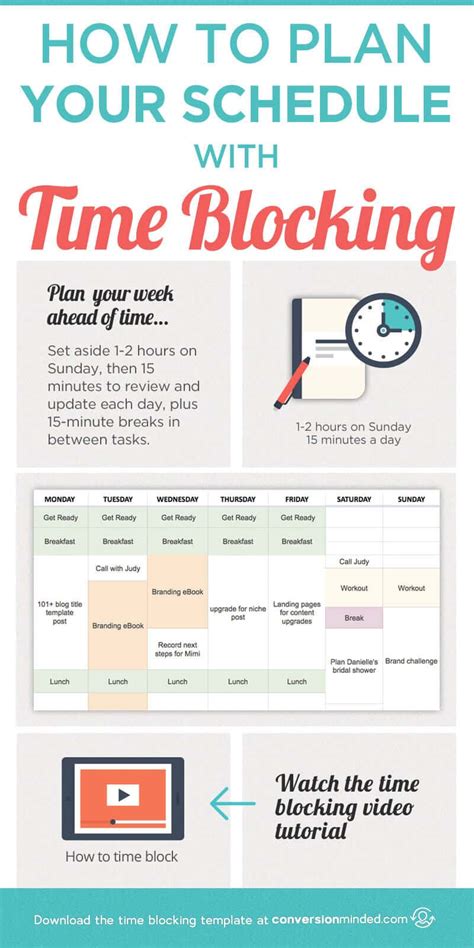In today's fast-paced world, it's becoming increasingly important to manage our time effectively in order to achieve our goals and optimize our output. Whether you're a student, a professional, or a busy homemaker, mastering the art of time management can significantly improve your efficiency and overall satisfaction with your work.
Successful individuals know that time is a valuable resource that should be utilized wisely. It's not about doing more, but about working smarter and maximizing productivity. By adopting a few simple techniques and strategies, you can transform your approach to time and streamline your daily tasks, freeing up valuable moments for more fulfilling activities.
One crucial aspect of effective time management is prioritization. When faced with numerous tasks and responsibilities, it's essential to identify and focus on the most important and urgent ones. By distinguishing between what truly matters and what can be delegated or eliminated, you can allocate your time more efficiently and avoid unnecessary stress.
Set Clear Objectives and Prioritize

One key aspect of maximizing your efficiency and managing your time effectively is to establish clear goals and determine their priority. By clearly defining what you want to achieve and understanding the relative importance of each task, you can strategically allocate your time and resources to accomplish them in the most efficient manner.
A beneficial approach is to start by outlining your objectives in a structured manner, which helps provide clarity and direction. Clearly articulated goals provide a sense of purpose and enable you to focus your efforts on tasks that align with your overall objectives.
Prioritization is another crucial aspect of effective time management. Once you have established your goals, you should assess the relative significance and urgency of each task. Prioritizing tasks allows you to allocate your time and energy to those activities that are most important and time-sensitive. This ensures that you address critical tasks promptly while maintaining a clear focus on your overall objectives.
| Benefits of setting clear goals and prioritizing: |
|---|
| Increased productivity: Clearly defined goals enable you to channel your efforts towards activities that directly contribute to achieving your objectives, minimizing time wasted on less important tasks. |
| Enhanced focus: Prioritizing tasks helps you maintain a clear and focused mindset, avoiding distractions and allowing you to make progress towards your goals. |
| Efficient resource allocation: By determining the relative importance and urgency of tasks, you can allocate your time, energy, and resources effectively, optimizing your productivity. |
| Reduced stress: Clear goals and a prioritized task list alleviate stress by providing a structured approach, allowing you to work systematically towards achieving your objectives. |
Eliminate Distractions and Stay Focused
In order to maximize your efficiency and accomplish your tasks effectively, it is crucial to eliminate distractions and maintain a sharp focus. By reducing external disturbances and optimizing your internal environment, you can enhance your productivity and achieve your goals.
Minimize Interruptions: To minimize interruptions, identify the common sources of distraction in your workspace and take appropriate actions. Turn off notifications on your phone and computer, close unnecessary tabs and applications, and create a dedicated and clutter-free work area.
Establish Priorities: Prioritize your tasks based on importance and urgency to avoid getting overwhelmed. Use a to-do list or task management tool to organize your responsibilities and allocate specific timeframes for each task. This will keep you focused and prevent you from getting sidetracked by less important activities.
Utilize Time Blocking: Time blocking involves dividing your day into chunks of time dedicated to specific tasks or activities. This technique helps you allocate focused time for important tasks and prevents them from being overshadowed by less critical activities. By blocking distractions during these dedicated time slots, you can maintain a heightened level of concentration.
Practice Mindfulness: Cultivating mindfulness allows you to train your mind to be fully present in each moment. By practicing techniques such as deep breathing and meditation, you can improve your ability to concentrate and stay focused. Engaging in regular mindfulness exercises can also reduce stress and increase your overall well-being.
Eliminate Temptations: Identify and eliminate any temptations or habits that may lead to distractions. This may include removing unnecessary items from your workspace, resisting the urge to check social media during work hours, or finding alternative ways to handle personal tasks that can arise throughout the day.
By implementing these strategies and creating an environment conducive to focus, you can eliminate distractions and optimize your productivity. Remember, staying disciplined and committed to your goals will help you achieve success in managing your time effectively.
Master Your Efficiency by Implementing Time Blocking and Establishing a Well-Structured Schedule

In order to optimize your output and make the most of your time, it is crucial to implement effective time management techniques such as time blocking and creating a well-structured schedule. These practices help you prioritize tasks, allocate dedicated time slots to specific activities, and ensure that your workflow remains organized.
Time blocking is a method that involves dividing your day into distinct blocks of time, each dedicated to a particular task or group of related activities. By designating specific time slots for different responsibilities, you can eliminate distractions and stay focused on the task at hand. This allows you to sequentially tackle your to-do list and accomplish tasks more efficiently.
Creating a schedule further enhances your time management capabilities. By clearly outlining your daily, weekly, or monthly commitments, you gain a holistic view of your available time. This enables you to allocate appropriate time blocks for routine tasks and important projects alike. Additionally, a schedule helps in identifying potential conflicts or overlaps, allowing you to make necessary adjustments and prioritize accordingly.
An effective approach to implementing time blocking and creating a schedule is to start with identifying your most important and urgent tasks. By allocating dedicated time slots to these critical activities, you ensure their timely completion and minimize the risk of overlooking them amidst other less significant tasks.
It is important to remember that flexibility is key when implementing time blocking and creating a schedule. Unexpected events or urgent matters may arise, requiring changes to your planned schedule. By being adaptable and allowing room for adjustments, you can efficiently handle unforeseen circumstances while still maintaining your overall structure.
In conclusion, by incorporating time blocking and a well-structured schedule, you take control of your time and maximize your productivity. These practices boost focus, eliminate distractions, and facilitate efficient task completion. By investing the effort to prioritize and allocate time effectively, you optimize your workflow and achieve your goals more effectively.
Delegate and Outsource Tasks
Increase your efficiency and effectiveness by delegating and outsourcing tasks to others.
- Identify tasks that can be assigned to someone else to free up your time and focus on more important responsibilities.
- Consider the skills and strengths of your team members or colleagues to determine who is best suited for each task.
- Communicate clearly and provide specific instructions and expectations when delegating tasks to ensure successful completion.
- Regularly check in and provide support to those you have delegated tasks to, but also give them the autonomy to work independently.
- Outsource tasks that require specialized skills or expertise that you or your team may not possess.
- Research and carefully select reliable and trustworthy external resources or service providers to outsource tasks to.
- Monitor the progress and quality of outsourced tasks to ensure they meet your standards and objectives.
- Evaluate the effectiveness of delegating and outsourcing tasks, making adjustments as needed to optimize productivity.
By delegating and outsourcing tasks, you can leverage the skills and time of others, allowing you to focus on higher-level work and achieve greater productivity in your overall workflow.
FAQ
What are some time management tips for boosting productivity?
Some time management tips for boosting productivity include setting specific goals, prioritizing tasks, creating a schedule or to-do list, minimizing distractions, and taking breaks.
How can I set specific goals to improve my productivity?
To set specific goals, start by identifying what you want to achieve and break it down into actionable steps. Make sure your goals are measurable, realistic, and time-bound. Write them down and review them regularly to stay focused and motivated.
What are some effective strategies for prioritizing tasks?
Some effective strategies for prioritizing tasks include determining urgency and importance, using a priority matrix or to-do list, focusing on high-value activities, and delegating or eliminating non-essential tasks.
How can I create an effective schedule or to-do list?
To create an effective schedule or to-do list, start by categorizing tasks by urgency and importance. Use a digital or physical planner to organize your schedule and allocate specific time slots for each task. Be realistic with your time estimates and be flexible to adjust as needed.
What are some tips for minimizing distractions and staying focused?
Some tips for minimizing distractions and staying focused include turning off notifications, scheduling dedicated work blocks, creating a designated work space, using time management apps or website blockers, and practicing mindfulness or meditation techniques.



